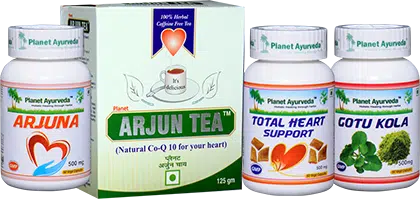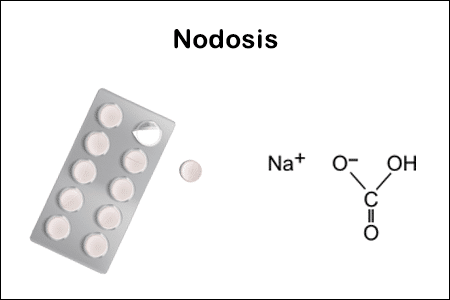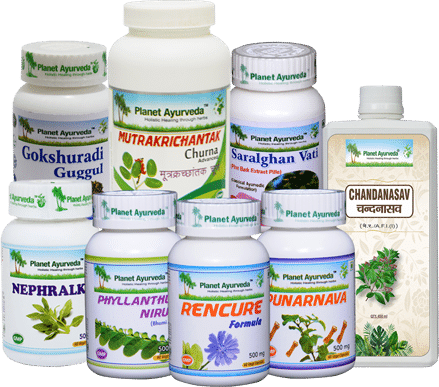Heart Health and Best Natural Supplements for Heart
OVERVIEW
मर्माणि बस्तिं ह्रुदयं शिरश्च प्रधानभूथानि………॥(च.चि.२६/३)
ह्रुदयम् चेतनास्थानमुक्तं….।(सु.शा. ४/३४)
Ayurveda has considered the heart as one among the trimarma, seat for ojas, chetana(praana) & tridoshas which specifies the vitality of the organ.
In today & scenario we are facing many health issues because of wrong lifestyle, increased mental worries, & not following the rituals properly. All these may have direct or indirect impact on our heart. According to WHO in 2019, an estimation of 17.9 million people died from CVDs which represents 32% of all global deaths. (1) The increased morbidity & mortality rate is a warning alarm to consider caring of the heart by means of natural remedies, yoga & pranayama. This article helps to understand the importance of the heart & its care in a natural way.

INTRODUCTION
Concept of heart as in Ayurveda
Acharya Sushrutha explains that formation of heart starts at foetal stage in the month of fourth.
चतुर्थे……गर्भह्रुदयप्रव्यक्तिभावाच्चेतनाधातुरभिव्यक्तो भवति…….(सु.शा.३/१८)
So caring of the heart begins in the mother's womb itself by following proper pregnancy regimens.
While forming the foetus maternal factors contribute towards the formation of the heart. They are the superior part(prasada bhaaga) of Rakta & Kapha.
शोणितकफप्रसादजं ह्रुदयं…। (सु.शा.४/३१)
Heart is compared to the downward faced lotus. Its beats are explained as closure & opening of the lotus.
पुण्डरीकेण सद्रुशं ह्रुदयम् स्यादधोमुखम्॥ (सु.शा.४/३२)
CARDIOVASCULAR DISEASE & CAUSATIVE FACTORS
In classics CVD explained under Hridroga which caused by doshik variation or external injury due to trauma or krimi.
Disorders related to heart & blood vessels are considered as cardiovascular diseases. It can be
congenital (since birth) or non-congenital. CHD occurs due to structural deformity of the heart which ends up in poor performance. Ex ASD, VSD, PAD in general known as hole in the heart. Non congenital diseases include heart failure, CAD, pericardial diseases etc.
Ignoring proper pregnancy care or a person indulging in below things in excess leads to Heart
diseases.
| Food factors | Activities | Psychological factors | External factor | Risk factor |
| Dry, unctuous, heavy for digestion | Sedentary lifestyle | Grief | Trauma to heart | Hereditary |
| Sour & salty items, alkali | Inadequate Eating, Fasting | Anger | Infectious diseases | obesity |
| Hot in potency | Eating before the digestion of previous food | over thinking | Diabetes | |
| Sweet & fatty items | Excessive eating | Fear, Panic | High cholesterol & blood pressure | |
| Smoking | Risk factor | |||
| Physical exercise | Hereditary |
SYMPTOMS
- Every type of hridroga has its own signs & symptoms. Some of the cardiac disorders appear asymptomatic also. In general following can be considered
- Discoloration (pale/cyanosed), Fainting, confusion, Dyspnoea, Anorexia, Nausea/vomiting, Thirst, Abnormal taste in the mouth, Fever, Cough & Pain.
- Pain in terms of discomfort in the centre of the chest, in the arms, the left shoulder, elbows, jaw, or back.
MANAGEMENT
आहारसम्भवं वस्तु रोगाश्चाहारसंभवाः ।(Cha.Su.28/44)
- This explains, Food is the source for body formation thus healthy food forms healthy body or else leads to various diseases.
- Ayurveda believes in saying Prevention is better than cure. Hence it says about Garbhini paricharya( pregnancy care), Dinacharya & ritucharya.
लाघवं कर्मसामर्थ्यं दीप्तोऽग्निर्मेदसः क्षयः ।
विभक्तघनगात्रत्वं व्यायामादुपजायते ॥ (A.H.Su. 2/10)
By doing routine physical exercise one can attain lightness of the body, more physical strength, increased appetite, proper fitness & reduced fat level. Yoga also has similar benefits. Below mentioned asanas helps in relaxation of body & mind, promotes flexibility,improves circulation & strengthens muscles & bones.Both helps in reducing the risk of CVD by lowering blood pressure, cholesterol & blood glucose level.
Prevention or early management can be done by diagnosing the diseases as soon as possible by means of specific investigations like ECG, Echocardiography, Doppler study, Radionuclide test, Doppler study etc.
American Heart Association says to adopt following things
- Manage Blood Pressure
- Control Cholesterol
- Reduce Blood Sugar
- Get Active
- Eat Better
- Lose Weight
- Stop Smoking
All these are explained in our classics long back in terms of Nidana parivarjana & Pathya paripalana.
CLASSICAL FORMULATION
Treatment based on involved Dosha
| VATAJA | PITTAJA | KAPHAJA |
| Punarnavadi taila | Drakshadi ghrita | Katphaladi kashaya |
| Pushkaramuladi kwatha | Kasherukadi ghrita | Udumaradi leha |
| Haritakyadi ghrita | Sthiradi ghrita | Shilajit Rasayan |
| Tryushandi ghrita | Chyawanprash, | |
| Pathyadi kalka | Agastya-haritaki avaleha | |
| Braahma Rasayana |
Dose & Anupana depends on the condition of the patient.
Treatment based on severity of Pain(Cha.chi.26/101-102)
The patient in whom
- The pain becomes severe after consuming food & relieves when the food is completely digested – Churna of Devadaru, Kushta, Tilwaka, Saindhava & Sauvarchala lavana, vidanga has to be administered with warm water.
- If the pain gets aggravated during the digestion process – Virechana therapy should be administered using swarasa of Drakshadi madhura dravya.
- If pain persists & is in severe form after the intake of food, during the digestion process & even after completion then – Virechana should be done by using Danti moola or nishitha moola.
HERBS FOR HEART
Acharya Charaka has mentioned ten herbs under Hridya gana which are said to be Cardio protective. (Cha.Su.4/10)
| NAME | BOTANICAL NAME | USEFUL PART |
| Amra | Mangifera indica | Fruit |
| Amrataka | Spondias pinnata | Seeds |
| Lakucha | Artocarpus lakoocha | Fruit |
| Karamarda | Carissa carandes | Fruit |
| Vrikshamla | Garcinia indica | Fruit |
| Amlavetasa | Garcinia pedunculata | Fruit |
| Kuvala | Zizyphus sativa | Fruit |
| Badara | Zizyphus jujuba | Fruit |
| Dadima | Punica granatum | Fruit |
| Matulunga | Citrus limon | Fruit |
PROPERTIES & MODE OF ACTION
Most of the above mentioned drugs have sour & sweet taste which helps in regulating cardiac functions. Because of its hot potency (except few) & amla vipaka it helps in reducing lipid & clot deposition & also acts as digestive, carminative & appetizers.
DESCRIPTION OF THE HERBS GOOD FOR HEART HEALTH
1. ARJUNA (Terminalia arjuna)
Arjuna possesses hypocholesterolemic, hypotensive, antiplatelet and thrombolytic activities which plays an important role in the management of cardio-vascular and cerebrovascular disorders. Beneficial effects of Arjuna in patients of chronic stable angina, endothelial dysfunction, heart failure and ischemic mitral regurgitation has been reported in clinical studies.(2) Hence it is a drug of choice in many cardiac diseases. It is used in the form of churna, kwatha, gutika & sheerapaka.
2. PUNARNAVA (Boerhavia diffusa)
It has a cold potency. Also possess hypoglycemic, anti fibrinolytic, immunomodulatory activities. As it contains anti-inflammatory & antioxidant properties, It helps in lowering the risk of congestive heart failure.
3. PIPAL TVAK (Ficus religiosa)
It has Antimicrobial & anti diabetic properties. The fruit which has cold potency acts as cardio tonic.
4. DALCHINI (Cinnamomum zeylanica)
It has the ability to reduce cholesterol level in diabetic patients & lowers the blood glucose level. By which it reduces the risk of CVD.
5. CHHOTI ELAICHI (Elettaria cardamomum)
In classics (Raja nighantu) hridroga is mentioned as one of the indications. It has the Hridya property(Cardiac tonic). It helps in enhancing fibrinolysis properties, reducing blood pressure & improving antioxidant status.
6. ASHWAGANDHA (Withania somniferum)
It is considered as the nervous tonic. This specifically helps in conditions like anxiety, stress, depression etc. It also helps in cardiac health by strengthening heart muscles, maintaining proper blood flow & cholesterol level. It also has anti diabetic properties.
7. BRAHMI (Bacopa monnieri)
It is known for its medhya property(brain tonic). Brahmi is categorized under Balya gana ( herbs which helps in improving immunity & strength). It has mehajit(anti diabetic) & antioxidant properties. It helps in maintaining normal vascular muscle functions by increasing the utilization of nitric acid.
8. SHANKAPUSHPI (Convolvulus pluricaulis)
It is also known for its Medhya property & one of the best stress relieving herbs. It also acts as an antidepressant.
HEART CARE PRODUCTS IN PLANET AYURVEDA
Planet Ayurveda is a trusted and famed organisation offering herbal products across all over the world. These products are 100% natural and prepared using standardized extract of herbs. Planet ayurveda products are safe and made without using any chemical, additive, binder, and preservatives. Along with heart health, these products are useful in numerous health ailments. Following are the list of formulations prepared using above mentioned herbs in combo named as HEART CARE PACK
- ARJUNA CAPSULES
- ARJUN TEA
- TOTAL HEART SUPPORT
- GOTU KOLA CAPSULE
PRODUCT DETAILS
1. ARJUNA CAPSULES
It contains standardized extract of Arjuna (Terminalia arjuna).
Dosage – 2 Capsules, twice daily with plain water.
2. ARJUN TEA
It is an herbal tea which contains Arjuna, punarnava, pipal tvak, Dalchini & Elaichi.
Dosage – 2 Cups, twice daily.
3. TOTAL HEART SUPPORT
It is a capsule made with the combination of Arjuna , Ashwagandha, Brahmi and Shankhpushpi.
Dosage – 2 Capsules, twice daily with plain water.
4. GOTU KOLA CAPSULE
Gotu kola is a very impressive herb that has spectacular effects on stabilizing the plaque in the blood vessels.
YOGA FOR HEART CARE
| Standing posture | Sitting posture | Sleeping posture |
| Tadasana | Marjarasana | Bhujangasana |
| Trikonasana | Paschimottanasana | Dhanurasana |
| Utkatasana | Ardha matsyendrasana | Setubandhasana |
| Utthita hasta padasana | Shavasana | |
| Adho Mukha shavasana |
CONCLUSION
तन्महत् ता महामूलास्तच्चौजः परिरक्षिता । परिहार्या विशेषेण मनसो दुःखहेतवः ॥
ह्रुद्यं यत् स्याद्यदौस्यं स्रोतसां यत् प्रसादनम् । तत्तत् सेव्यं प्रयत्नेन प्रशमो ज्ञानमेव च ॥ (Cha. Su. 30/13-14
Person who wants to keep his heart & blood vessels healthy should avoid factors which traumatize the mind. He should consume a wholesome diet, medicine & follow activities which are favourable to Heart & ojas. Whatever the medicines, therapies & yogas mentioned above has its own limits in terms of indication, contraindication & side effects. Hence it should be followed only under the guidance of an Ayurvedic physician.




